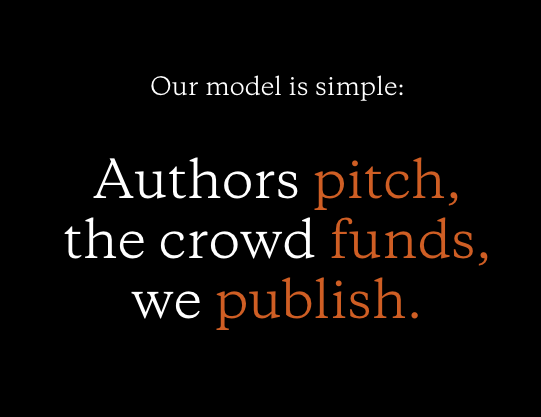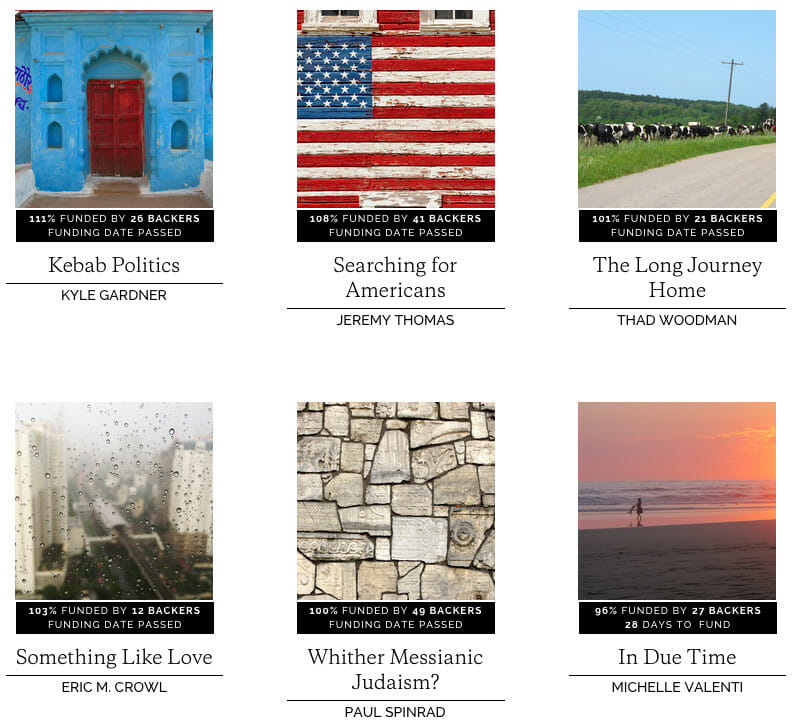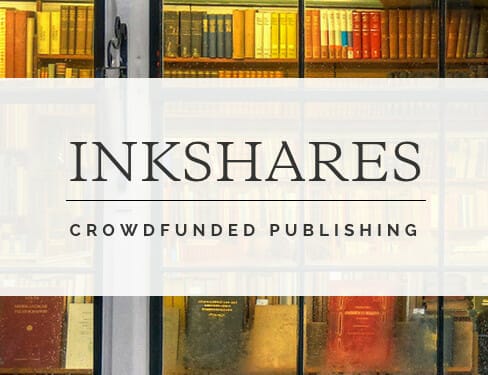Publishing a book can be an intimidating journey. But what if you had a supportive audience on board already? What if your readers were so eager for a taste of your work, they backed it with their hard-earned cash in exchange for a peek inside the writing process?
Such is the premise behind new crowd-driven publisher Inkshares. In a sort of mashup of crowdfunding, editing and marketing, Inkshares created a new way to publish books — books an audience has already shown they want to read.
Curious about this new player in the publishing industry, The Write Life Editor Heather spoke with Inkshares co-founder and Chief Legal Officer Adam Gomolin to learn more.
You’ve described Inkshares as “crowdfunding meets publishing.” How does it work? How does it differ from other crowd-driven publishing companies?
Great question. We are a “value-added” crowdfunder — we hear people refer to us as “Kickstarter meets Random House.”
If you are successfully crowdfunded, we handle the rest: editorial through distribution. We pair you with a top editor or editorial team, and handle design, production, and distribution — including into actual brick-and-mortar stores. In that sense, we’re really a full-service publisher, just like any of the Big Five or indie publishers.
And yes, there are other crowd-driven publishers: Unbound, Pubslush, Beacon, FG Press, Contributoria and Pentian, to name a few. There are a lot of interesting dynamics at work, and I contrasted Inkshares and Contributoria in a post on the Inkshares blog.
Some are focused on specific types of content; Beacon is all about investigatory journalism, for instance. We don’t have a niche, because we think that one of the most important things is to build a neutral platform for literary crowdfunding. Many authors move across different genres and readers (i.e. backers) do as well. They may write (or we may read) longform on one day, a book on another.
There are a lot of great companies in this space, with a lot of important differences between us. But I think that authors are a heterogeneous bunch, so ultimately they’ll match up with the right “new” or “crowd-driven” publishers.
Say I’m an author with a manuscript I’d like to publish. What makes Inkshares my best option? How does it fit with my other options for self-publishing?
I think you need to focus on what you want out of the process. The traditional publishing process is defined by its obstacles. The “slush pile” is a barrier few can get over, and getting an agent is equally difficult — and more costly in terms of time. That is really what so many new publishers are trying to provide an alternative to.
Inkshares provides an editorial and production experience equivalent to that of legacy publishing. Daniel Wallace, bestselling author of Big Fish, is crowdfunding a children’s book titled The Cat’s Pajamas. We paired Daniel with Carol Goldenberg, a top children’s book designer who has won six Caldecotts, and Kim Keller, a top children’s book editor formerly of Houghton. So if that’s something an author wants — editorial, design, production, distribution — we’re a great fit. If you want to go it alone at a self-publisher like CreateSpace, more power to you.
Crowdfunding is also a major component of Inkshares — you need to be willing to get out there and promote your work. There are reverberative effects (i.e. backers creating other backers) and virality that can drive runaway successes, but ultimately you can’t expect to put a proposal up, walk away, and have it magically fund.

What kinds of writing projects are published through Inkshares?
We’re an omnivore — absent a dilemma. We focus on individual projects and authors. As we mature, there is the prospect of more of an imprint-style experience that would allow for backers to browse across a genre.
Our users thus far are varied, and that diversity is important. Samuél Barrantes and Kris Calvin are great examples of aspiring debut authors who chose to go with us, rather than slugging it out in the traditional system. Leigh Cowart and David Forbes are young journalists, both immensely talented, and we’re in a great place to help them raise thousands of dollars to fund their endeavors. For Daniel Wallace, it’s different — he’s an established bestseller who went with us because this project didn’t fit with his traditional publisher.
How does the funding process work?
Crowdfunding for books is similar to “general” crowdfunding in the sense of a typical series of phases: you need to activate your primary social network (friends and family) to get to a critical mass, say 30 percent. There is a corresponding activation of your secondary social network that pushes you toward, and hopefully past, 50 percent. But I think the projects that succeed are the ones that connect with people: they go viral because people care about them and want them to succeed.
Some of the backers who don’t know you personally get into your project because they want to be part of the social movement — some people really want to help get Samuél’s first novel off the ground, which is why we’ve seen $50, $100 and $200 donations. Others simply want to order it the way that they would pre-order it on Amazon. But in both those cases, it’s more about the backer’s interest (I want to be part of helping create this book, or I want to read this book) than their desire to support a friend or family member.
What percentage of projects are completely funded? What strategies are writers using to promote their work and reach their funding goals?
We have only had one project fail to meet its goal so far. It’s probably too early to assert trends, except to say that hard work pays off and people are excited to be in on the beginning of a work.
It’s really a game of getting interested eyeballs on your work. One way is by targeting interested blogs, which David Forbes did well. Another is by getting high-powered retweets from major tweeters. But we’re also focused on reaching out to libraries and bookstores — dragging commerce to the crowdfunding stage.
What happens if a project isn’t 100 percent funded — or if one is funded over 100 percent?
We’re all or nothing. Projects that don’t get there don’t get funded. It’s important that we deliver the best copy of a work — that requires resources — not a diluted version that disappoints.
If a project is funded over 100 percent, those funds go toward more copies of the work. We refer to it as “surplus.” Conceivably it could also go back to the author — a welcome quandary that we hope to be able to explore.

How do you match authors with editors and designers?
We do it in a high-touch way. Matching the right editor with the right author is a really organic and important piece.
Sometimes that will mean using our talented, in-house editorial crew (to which we are consistently making additions). But sometimes there is a niche topic we can’t cover as well as someone else, in which case we will use our network to contact and contract the best person.
You’ve mentioned that Inkshares would like to offer backers equity in the books they support, giving them a share of any potential revenue. How would this work?
Right now, you can’t go give out equity in a company — you can’t say, “I’ll share x amount of royalties in exchange for y amount of dollars.” Title III of the JOBS Act, which is presently being implemented by the SEC, is changing that.
Once the SEC says we can do it, we’ll be exploring that idea more fully. It’s not for every book, but it is a great incentive to offer backers in certain circumstances.
Where do you see Inkshares going in the next few years? What are your goals for the company?
I’d like to see us put books on a couple different bestseller lists in the next year, sending a clear signal that we can create quality work on par with any publisher and across multiple genres. I’d also like to see a lot of pre-orders from bookstores and libraries — an indication that we can drag all that commercial activity upstream to the crowdfunding stage.
And I’d like to see more people saying I want to “Inkshare” my book. We see that happening on Twitter already, but it would nice to be a verb. Maybe we’ll crowdfund a dictionary and put “Inkshares” in there. (Kidding.)
Thanks for taking the time to share your thoughts, Adam!
What do you think of Inkshares’ model? Would you publish your work through the platform, or back a work-in-progress there?







